
Theologou was one of the first vehicle manufacturers in Greece. It was created by Nikos Theologos, a Greek mechanic who had lived and worked for a few years in the US, and founded this company after he returned to Athens, Greece in 1906. Around 1916 he designed and constructed a light passenger car with a motorcycle engine; according to his descendants, the efforts had started in 1908, and since 1916 a small number were built. His company, nonetheless, produced a variety of bus and truck bodies, mostly on Ford chassis in the 1920s. By the late 1920s it was facing strong competition by larger companies like Tournikiotis and Athena in Athens, Bouhagier in Patras and others, which also produced vehicles on imported chassis, and was soon eclipsed by them.
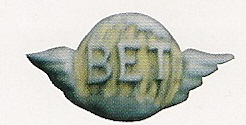
Biotechnia Ellinikon Trikyklon, or BET, was a small vehicle manufacturer founded in Athens by Petros Konstantinou. It was one of several manufacturers - the first appearing in the early 1940s - that converted BMW or other motorcycles into light utility three-wheelers. In 1965 it entirely designed and built a small five-seat passenger car with a BMW 125cc motorcycle engine. Although the type was certified, only one was built due to problems in availability of parts for further production. Following this design, three-wheeled truck models were developed and produced. A second passenger car model was designed and introduced in 1973, known as model 500, with a Fiat 500cc engine. With metal body, seating up to five passengers and featuring very good road handling, it was a rather advanced three-wheeler for its time. It was certified for production and 15 were built, of which one survives to this date in excellent condition. There were even talks with a South African company involving plans for exports or even transfer of production to that country, but they were never realized. The company ceased production in 1975.

MEBEA was an important Greek vehicle manufacturer, producer of light trucks, passenger automobiles, motorcycles, motorbike engines, agricultural machinery and bicycles.
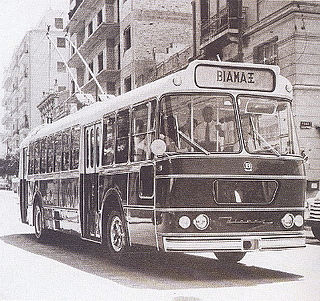
BIAMAX(Proper Greek pronunciation Viamax) was a Greek vehicle manufacturer. In the late 70's it was one of the biggest Greek companies, operating three factories and several other auxiliary facilities throughout the country. In addition, BIAMAX became a leading industry in Greece, in areas including Quality Assurance, technical training, process documentation and Research & Development. Although its main activity was vehicle manufacture, some of its subsidiaries were also involved in areas like tourist services, exports of farm products and shipping.

STYL KAR was named after its founder, the engineer Stylianos Karakatsanis. Its entire history is representative of many Greek companies who were engaged in the construction of simple utility vehicles.

Attica was a brand name of vehicles produced by Bioplastic S.A., a company created in Moschato, Athens by Georgios Dimitriadis, a figure in Greek automotive history.

DIM Motor Company, a Greek automobile maker, was created by Georgios Dimitriadis as a successor to his earlier company, Bioplastic S.A., which had produced the Attica automobile. The DIM represented one more effort by Mr. Dimitriadis to design and develop a modern car entirely by his company's own means. A 400cc, air-cooled, 2-cylinder, 30-hp engine was also developed in-house to power the vehicle, but due to delays in the engine development, the car was introduced with a 600cc engine and other mechanical parts of the Fiat 126 model. A 650cc Fiat engine was also used, in an improved version. The car was finally introduced at the Geneva Motor Show in 1977, and for this reason received more publicity than most Greek vehicles, appearing in many international publications. All development work had been made in a factory intended for its production in Acharnes, while the company was advertised in the Greek press; plans were also made for more versions, including a sports coupe. However, the costs involved and the car's poor prospects in the Greek market resulted in termination of production after only about ten had been produced. The whole project was abandoned in 1982, having been Georgios Dimitriadis' last venture in the automotive industry.
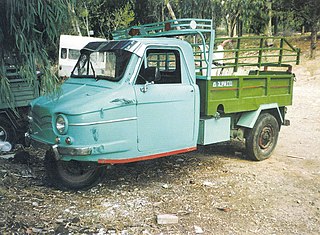
Pan-Car was a Greek producer of automobiles and light trucks, operating between 1968 and 1994. As was often the case in Greece, its name comes from that of its founder, Panayiotis Caravisopoulos. In 1968 it was one of many Greek companies that produced three-wheeled trucks, using Volkswagen engines. In 1977 it introduced beach buggy models built on Volkswagen chassis, which were produced for several years. In 1992 it introduced a jeep-type automobile, also with Volkswagen mechanicals. The model faced a problem common to such ventures in Greece, i.e., receiving type certification for production. That, and financial problems, forced the company to go out of business in 1994.
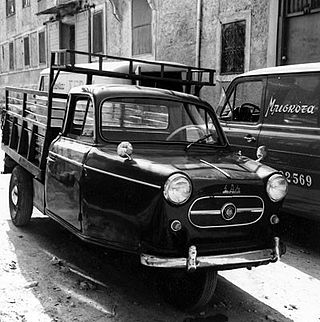
The name SAM stands for Stephanos A. Mbaltas, the founder of this Greek company, one of several that produced three-wheeler trucks in that country, in business between 1966 and 1974. Its first models used 1200cc Volkswagen air-cooled engines, while Ford 1300cc engines powered later models. The chassis developed by SAM was very robust and some of its trucks were surviving 30 years after the company went out of business.

Malkotsis was the trade name for Technica S. Malkotsis A.E., which has historically been the most important Greek engine manufacturer, surpassing several engine manufacturers that flourished in Greece in the 1920s and (mostly) 1930s, like Dimadis-Kanakis in Volos, Peteinaris in Kalamata, Sideris, BIO, and others in Athens, etc. Located in Piraeus, before World War II Malkotsis produced various types of industrial machinery. After the war it produced industrial machinery for several Greek companies, but it progressively focused almost entirely on diesel engines, soon becoming the largest company in its field. Malkotsis engines found use in a variety of industrial applications, while its boat engine models became legendary for their reliability. A series of electric motors was produced as well. Its EM Diesel series included engines specifically designed for powering of vehicles and was employed in Malkotsis's own farm tractor models introduced in 1959. The tractors were produced for only a few years, due to lack of funding and other problems related to a complete lack of state support. The company faced financial problems later, due to competition from cheaper imports, and was acquired in 1991 by Drakos-Polemis A.E., a pump manufacturing company which used all Malkotsis infrastructure for its production purposes.

Ros was the trade name of vehicles produced by the Greek company 'Stavros Konstantinides O.E.', based in Athens. The Ros three-wheeler trucks were the most successful of its kind in Greece, having been produced by the thousands. Ros surpassed in sales even "Greek classics" like Alta and Styl Kar, and the characteristic shape of its trucks could be seen for several years in every corner of the country. And for good reason: The 'Rosaki' was one of the most robust and reliable vehicles ever used in Greece. In 2006, 30 years after the end of three-wheeler production, several Ros were still in use in excellent condition, more than any other three-wheeler type.
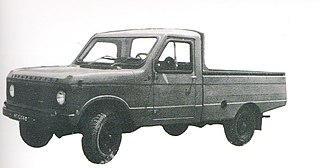
Balkania was the trade name of 'K. Zacharopoulos A.B.E.E.' a Greek industrial and trading company based in Athens that produced 4x4 jeep-type vehicles and 4x4 trucks. Since 1945, K. Zacharopoulos had been involved in vehicle repair and rebuilding. The Balkania company was founded in 1954 and since 1972 it imported Romanian and Indian vehicles. In 1975 it designed and introduced its own Autotractor model, a 4x4 multi-purpose truck with a Mercedes-Benz 3200 cc Diesel engine, metal cabin and a payload of 1,500 kg (3,307 lb). In 1979 the model was redesigned, with a modern synthetic cabin. It was produced, as some similar Greek vehicles, until a change of a favorable categorization for agricultural vehicles in 1984 limited its prospects. The vehicle was modestly successful, as it exhibited certain quality problems.
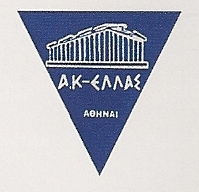
AK Hellas was a Greek manufacturer of light trucks and other metal products. It designed and produced two basic types of vehicles - all three-wheelers with 50cc engines, taking advantage of a favorable classification as "motorbikes" according to Greek law. One group of models it produced since 1965 were light trucks with "motorcycle" structure, a type of vehicle also produced in Greece by MEBEA, Mego, Alta, Saracakis, Pitsos, Markal, Naxos and others. The other group of models were "proper" micro-trucks, with "automobile" structure of steering, controls etc. It was in this category that AK Hellas became the biggest truck manufacturer in Greece, leaving behind MEBEA, Delta, Minicar, Zamba and other smaller Greek manufacturers. The company's T200 model, using a Sachs 50cc 4.8 hp engine and with a payload of 150 kg was produced between 1968 and 1975 with three different cab designs and in several versions. According to Dimitrios N. Aggelopoulos, several thousand units were produced, while other branches created by the same entrepreneur, were involved in production of pleasure boats, biological cleaning units, telephone booths, phone switchboards, generating sets, helmets, storage tanks, prefab container houses, wind turbine blades, irrigation systems, etc.

EBIAM was a Greek company based in Thessaloniki that, among others, produced 4x4 trucks. It belonged to a generation that benefited from a Greek law classifying any vehicle that could be used for agricultural purposes as "agricultural machinery".
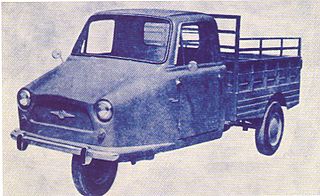
Motoemil was a Greek truck manufacturer based in Thessaloniki. It was named after Emilios Antoniades who started his business, together with his brother Konstantinos, by constructing crude-made trucks assembled from motorcycle and automobile parts. By the mid-1960s, like other similar Greek manufacturers, they were already developing and building complete "automobile" three-wheeler trucks. Motoemil was one of the first of its kind in Northern Greece and soon became the largest in that region, its products sold throughout the country. The first models used 1200cc Volkswagen air-cooled engines. A completely redesigned, more modern-looking model was introduced in 1970, using a German Ford engine.

Candia is a Greek company producing Agricultural machinery and equipment, based in Herakleion, Crete. It is representative of many companies in this country, that produced multi-purpose light farm vehicles.

Hercules was a Greek manufacturer of agricultural machinery based in Kerkyra (Corfu). It also produced light vehicles categorized as "farm equipment" according to Greek law, including light all-terrain vehicles. The latter used Namco parts and Mitsubishi, Kubota and Ruggerini engines. Small numbers of the particular type were produced between 1980 and 1983.
The Tiger 4x4 Armored Reconnaissance Scout Vehicle was one of several vehicles proposed to the Hellenic Army by Namco, a Greek vehicle manufacturer. The particular vehicle was designed in 1982.
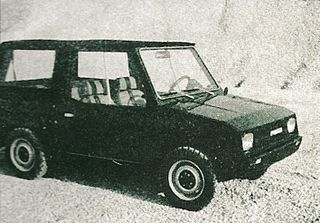
Autokinitoviomihania Ellados was founded in Athens in 1975 by a group of Greek businessmen, including the owners of the company importing Fiat in Greece.

Biomot was a small manufacturer of three-wheeled trucks and other metal products, based in Patras, Greece. Its trucks, produced since 1967, originally used rear-mounted VW air-cooled engines, as well as other VW parts. By 1975 the market for these vehicles had shrunk in Greece, being replaced by four-wheeled imported types. A new “modernized” front-engined model introduced by Biomot failed to save the company.



















